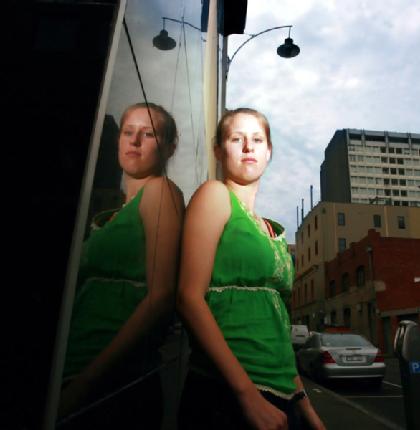
Lauren Burns clings to the hope that a minor change to Victorian fertility law will allow her to find her biological father. Photo: Ray Kennedy

Lauren Burns clings to the hope that a minor change to Victorian fertility law will allow her to find her biological father. Photo: Ray Kennedy
LAUREN Burns knows the state bureaucracy has her biological father's name.
Apparently, it is at the Public Records Office, along with other information from the former Prince Henry's Hospital.
He was a sperm donor, known to her now as C11, a blond man 180 centimetres tall and weighing about 73 kilograms, when he donated in 1979.
At that time, the process was confidential, and no laws existed to facilitate identification.
Four children, including Ms Burns, have been born to four families using his sperm.
Now, 25, Ms Burns wants to identify C11, and possibly meet him and her three half-siblings.
But she finds herself at a dead end, because legislation that lets donors and their offspring seek information about each other came into force in 1988, almost five years after she was born. This means she is not entitled to seek his name from the state, or even ask an authority created under the relevant law to write to him on her behalf.
The body, the Infertility Treatment Authority, has organised a voluntary register, which Ms Burns has joined. The register allows donors and their offspring, when a DNA match is made, to make contact and exchange information.
ITA chief Louise Johnson said it had facilitated 46 matches through the registers, and more than 120 donors had come forward under its Time to Tell campaign.
Ms Burns said she was not one of the matches.
She is adamant she is not looking for money, or a father figure, but wants to know more about her genetic identity.
"It is interesting that in almost every other situation, society strongly encourages fathers to be part of their children's lives, and those who refuse … are labelled deadbeat dads," she said.
"Yet in this exception, it is the exact opposite. Sometimes I feel labelled a deadbeat child for wanting to know the identity of my biological father, because I might upset or inconvenience him."
She said a donor always knew he was creating a child, and a reasonable person would realise the significance of that act.
Ms Burns has lobbied the State Government to accommodate her, and others in her situation. She fears the Assisted Reproductive Treatment Act, due to replace existing legislation by 2010, will not make her situation any easier.
She supplied a letter written by a lawyer on her behalf in February to Victorian Attorney-General Rob Hulls asking for identity issues relating to donor-conceived people to be referred to the law reform committee of parliament.
In a reply on February 25, the Department of Justice said her views had been noted, and the Government was considering whether to refer the issues. The letter said the new law was based on recommendations by the Victorian Law Reform Commission.
Ms Burns said the law failed to incorporate the commission's recommendation that the ITA be allowed to act as an intermediary in cases like hers.